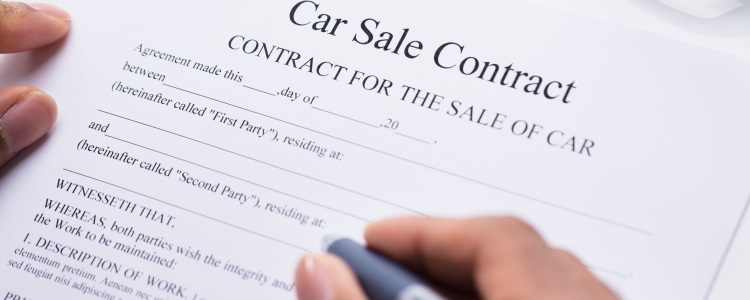Buying a car can be very exciting, but there may be a few loose ends to take care of before you get settled in.

7 Things to Do After Buying a Car
Before You Buckle Up
Qualifying for an auto loan and signing the dotted line is only the starting point of vehicle ownership. There may be some more paperwork that you need to take care of, and if it’s a used car, there are seven things that are worth considering after you finance your vehicle.
1. Auto Insurance
Being a car owner means having auto insurance. All states have guidelines on how much insurance your car needs to be considered road legal. Dealerships don’t typically let a buyer drive off their lot without proof of insurance, or at the very least, an insurance binder. A binder is temporary auto insurance until your official policy is finalized.
If you’re financing your vehicle, then you need full coverage car insurance. Auto lenders require that the car be covered with liability, collision, and comprehensive coverage (which is usually what they mean by full coverage). Remember that you need to meet your lender’s minimum insurance requirements or you run the risk of breaking your loan contract – which typically leads to repossession. Auto insurance shouldn’t be taken lightly, so act quickly if you haven’t already.
Additionally, if you purchased a brand new vehicle, it may be wise to consider GAP insurance as well. GAP stands for Guaranteed Asset Protection, and it can help you if you find you’re in a negative equity position and something happens to your vehicle.
2. Consider Getting a Spare Key
Sometimes, you aren’t given two keys when you purchase a vehicle. It’s possible that the manufacturer only includes one, or on a used car, the previous owner only handed one over when they sold it or traded it in.
If you only have one key, consider ordering another – especially if your auto insurance doesn’t cover locksmith services. Many newer vehicles have keyfobs that must be specially made. If you lose your only keyfob, it might be a while before you get another in the mail.
Keep the spare in a safe place in case you need it, and it could save you money on having to pay a locksmith out of pocket if you lose your set or lock yourself out!
3. Register the Vehicle/Temporary Tags
Registering your car in your name is essential when you purchase a vehicle. Some dealerships can handle this step for you, and you’re usually given temporary tags that allow you to drive until your new ones come in the mail. If you bought your vehicle from a private party, you need to head to the Department of Motor Vehicles or Secretary of State to get the vehicle registered in your name.
To register your vehicle, you typically need a valid driver’s license, bill of sale, the date of sale, the vehicle’s information, and proof of auto insurance. It can take a couple of weeks to get your tags in the mail.
4. Consider a Warranty
 Unless you bought a new or newer vehicle that’s under three years old, it’s likely that your car isn’t covered under a warranty. Brand new cars come with a manufacturer warranty that’s good until a certain age or mileage. Certified pre-owned vehicles come with a warranty as well. But if you finance or buy a used car, it may be worth it to look into an extended warranty.
Unless you bought a new or newer vehicle that’s under three years old, it’s likely that your car isn’t covered under a warranty. Brand new cars come with a manufacturer warranty that’s good until a certain age or mileage. Certified pre-owned vehicles come with a warranty as well. But if you finance or buy a used car, it may be worth it to look into an extended warranty.
Extended warranties, despite the name, don’t extend the manufacturer’s warranty. They’re actually third-party service contracts that cover some repairs. There are many different types of extended warranties, so when you’re reading through one, make sure to take a close look at the exclusions so you know what you’re buying and what isn't covered.
It’s also a good idea to look up your vehicle’s past recalls. Even brand new cars can come with faults. In most cases, a dealership can fix a recalled part for free if you have the recall letter.
5. Find Your Owner's Manual
All vehicles have an owner’s manual. If you purchased a used car, the previous owner may have left it in your glove compartment if you’re lucky. If you don’t see it anywhere, they’re usually available online.
While the common rule of thumb for oil changes is every 3,000 miles, and some higher-end oils require a change every 5,000 or so. However, your vehicle has its own guidelines for oil life. Refer to your owner’s manual for things like this, and other regular maintenance that your car may require.
6. Review Your Auto Loan Contract
If you’re financing your vehicle, it’s important to know what’s in your auto loan contract. You should know if you have prepayment penalties, when your term ends, and how much interest you’re going to pay over the life of the loan. Other important details you should learn are loan deferment options if you go through rough times and what you can do to avoid repossession if it comes down to that.
7. Take a Real Drive
Now that you’ve got everything in its place, you can take some time to learn about your car. Figure out windshield settings, find the hazard lights, hook up your phone, and learn how it handles different road conditions and situations.
The test drive is over and it's time for the real thing!
Preparing for an Auto Loan?
Getting approved for a car loan can be tough if your credit score isn’t perfect. Most traditional lenders prefer good credit borrowers, and if you don’t meet a lender’s credit requirements, it could mean an auto loan denial.
However, there are dealerships willing and able to assist borrowers with credit challenges. Here at Auto Credit Express, we want to help you find a dealer with bad credit lending resources. Fill out our free auto loan request form and we’ll look for a special finance dealership in your local area at no cost, with no obligation.

Senior Auto Financing Editor
Suggested Posts For You
Receive Free Updates
Get the latest credit tips, resources and advice delivered straight to your inbox.













